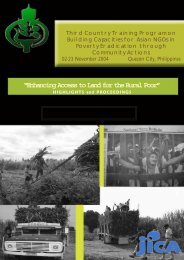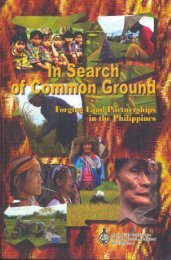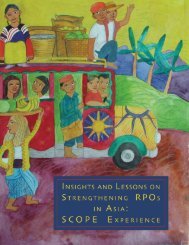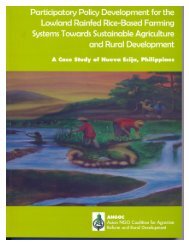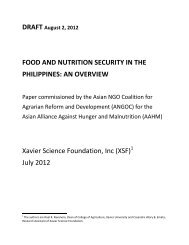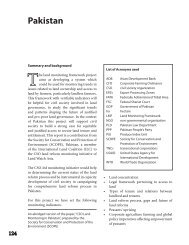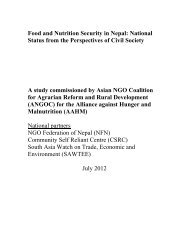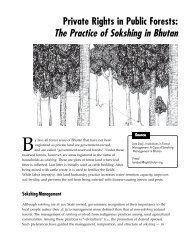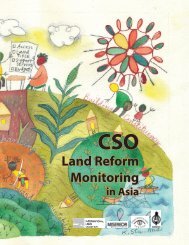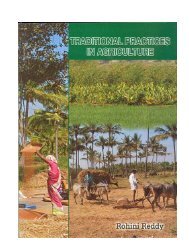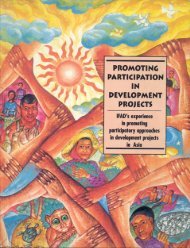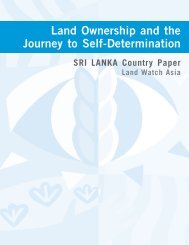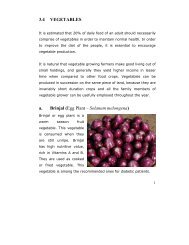Securing the Right to Land FULL - ANGOC
Securing the Right to Land FULL - ANGOC
Securing the Right to Land FULL - ANGOC
Create successful ePaper yourself
Turn your PDF publications into a flip-book with our unique Google optimized e-Paper software.
2. The campaign <strong>to</strong> recognize <strong>the</strong> cus<strong>to</strong>mary land rights of<br />
indigenous communities has <strong>to</strong> be stepped up at <strong>the</strong> country,<br />
and regional levels;<br />
3. The campaign against encroachment and violation of <strong>the</strong><br />
land and human rights of indigenous peoples has <strong>to</strong> be developed<br />
and conducted both at <strong>the</strong> country and <strong>the</strong> regional/international<br />
levels;<br />
4. Networking among civil society ac<strong>to</strong>rs and NGOs on issues<br />
concerning land, water, and forest rights needs <strong>to</strong> be<br />
streng<strong>the</strong>ned at <strong>the</strong> national and regional levels;<br />
5. Capacity-building of civil society organizations, community<br />
based organizations, and relevant government agencies has<br />
<strong>to</strong> be addressed;<br />
6. Interactions among inter-governmental organizations on<br />
land and agrarian reform issues need <strong>to</strong> be enhanced, and<br />
<strong>the</strong> implementation of <strong>the</strong>ir programs moni<strong>to</strong>red at <strong>the</strong><br />
country and regional/international levels; and<br />
7. Advocacy and lobbying on land and agrarian reform issues<br />
should be done with governments at country level, and<br />
collectively, through forums, such as South Asian Association<br />
for Regional Cooperation (SAARC), Association of<br />
Sou<strong>the</strong>ast Asian Nations (ASEAN), etc., at <strong>the</strong> regional/international<br />
levels.<br />
Endnote<br />
1<br />
Access <strong>to</strong> land in <strong>the</strong> narrow sense of <strong>the</strong> term can be defined as ownership<br />
and/or access <strong>to</strong> khas land; in <strong>the</strong> broader sense it includes ownership<br />
and/or use (usufruc<strong>to</strong>ry right) and/or proportionate <strong>to</strong> population<br />
size right of entry, use or accrual of benefits.<br />
References<br />
Abdullah, A. (1976). <strong>Land</strong> reform and agrarian change in Bangladesh. Journal<br />
of Bangladesh Development Studies, Vol. N, No. 1.<br />
Ahmed, S., & Rahman, S. (Eds.). (1992). Poverty alleviation through access<br />
<strong>to</strong> land. Centre on Integrated Rural Development for Asia and <strong>the</strong> Pacific<br />
and Economic Development Institute of <strong>the</strong> World Bank, CIRDAP<br />
Study Series No. 137<br />
Ahmed, K.U., & Baroi, A.A. (1994). Bhumi zorip paddhati teknikal rules (in<br />
Bangla): <strong>Land</strong> survey methods and technical rules. Dhaka: Paira<br />
Prokashani.<br />
THE BACKPEDALLING STOPS<br />
55<br />
Ahmed, M. (1991). <strong>Land</strong> <strong>to</strong> <strong>the</strong> landless. A reference book on khas land allocation<br />
in Bangladesh. Bangkok: Asian Cultural Forum on Development.<br />
Alamgir, M.K. (Ed.). (1981). <strong>Land</strong> reform in Bangladesh. Dhaka: Centre for<br />
Social Studies.<br />
Ali, A.M.M.S. (1986). Politics and land system in Bangladesh. Dhaka: National<br />
Institute of Local Government.<br />
Alim, A. (1979). <strong>Land</strong> reform in Bangladesh. Dhaka: Associated Printers Ltd.<br />
Bangladesh agricultural research council. (1998). Task force report on agricultural<br />
research and development plan for <strong>the</strong> coastal region of<br />
Bangladesh.<br />
Barkat, A. (1997). Population distribution, urbanization and internal migration<br />
in Bangladesh. A. Barkat, & S.R. Howlader, (Eds.). Population and<br />
development issues in Bangladesh. Dhaka: Ministry of Health and Family<br />
Welfare.<br />
. (1998). Governance of public health in Bangladesh. R. Sobhan<br />
(Ed.). Crisis in Governance: A Review of Bangladesh’s Development 1997.<br />
Dhaka: Centre for Policy Dialogue and University Press Limited.<br />
. (1999). Poverty among youth population in Bangladesh: Nature,<br />
extent and alleviation possibilities. Dhaka Viswavidyalaya Patrika<br />
(Dhaka University Studies), Dhaka.<br />
. (2001a, February). How much foreign aid does Bangladesh really<br />
need: Political economy of last three decades. Keynote paper presented at<br />
<strong>the</strong> national seminar “How much Foreign Aid Does Bangladesh Really<br />
Need?” of <strong>the</strong> Bangladesh Economic Association, Dhaka.<br />
. (2001b, February). Role of an International NGO in Human Development<br />
and Poverty Alleviation. PANEL paper presented at development<br />
of new five year strategic plan of CARE Bangladesh, Dhaka.<br />
. (2003, January). “Politico-economic scenario of Bangladesh:<br />
Where <strong>to</strong> go, where are we going?”. Paper presented at <strong>the</strong> national seminar<br />
Economic, Social and Political Situation in Bangladesh of <strong>the</strong><br />
Bangladesh Engineers Association and Federation of Bangladesh Chambers<br />
of Commerce and Industries, Dhaka.<br />
. (2003, March). Rural electrification and poverty reduction: Case<br />
of Bangladesh. Paper presented at <strong>the</strong> international forum Sustainable<br />
Rural Electrification in Developing Countries: Is It Possible, National<br />
Rural Electric Cooperative Association, Arling<strong>to</strong>n, Virginia.<br />
. (2003, July). Salient Findings of <strong>the</strong> Study. Paper presented at<br />
conference on economic and social impact evaluation of <strong>the</strong><br />
Bangladesh rural electrification program, Rural Electrification Board,<br />
Bangladesh, USAID thru RPPR-II, Dhaka.<br />
. (2003). <strong>Right</strong>s <strong>to</strong> development and human development: Concepts<br />
and status in Bangladesh. In H. Hossain (Ed.). Human rights in<br />
Bangladesh 2002. Dhaka: Ain O Salish Kendra.<br />
. (2007a). Agrarian-land-aquarian reform in Bangladesh: No better<br />
alternative in development. Paper presented at <strong>the</strong> sixteenth biennial<br />
conference of <strong>the</strong> Bangladesh Economic Association.<br />
ASIAN NGO COALITION FOR AGRARIAN REFORM AND RURAL DEVELOPMENT



